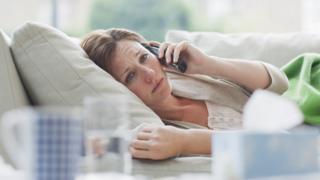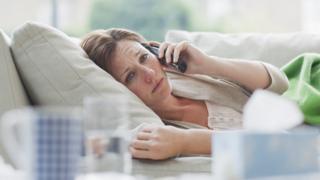Coronavirus: How do you self-isolate successfully?
From food delivery to dealing with family, here’s how those told to isolate themselves can avoid spreading the virus. …

 Image copyright Getty Images
Image copyright Getty Images Many more people may be asked to self-isolate to prevent the spread of the coronavirus in the UK, the NHS has warned. But what do you have to do if you might be at risk?
More than 80 people who spent two weeks in quarantine were hailed as setting an “important example” by NHS England chief executive Sir Simon Stevens, as he said people may increasingly be asked to isolate themselves.
There are no official figures on the numbers of people advised to self-isolate, but the approach is seen as a crucial way of minimising the spread of the virus.
But what does self-isolation mean and how do you ensure it works?
Who should isolate themselves?
You only need to isolate yourself if you’ve been told to by Public Health England (PHE) or the Department for Health and Social Care.
They’re tracing people who have been in “close and sustained” contact with individuals confirmed to have the virus – spending 15 minutes within two metres of an infected person is judged to be a significant risk.
The exception is if you have travelled to mainland China, Thailand, Japan, South Korea, Hong Kong, Taiwan, Singapore, Malaysia or Macau in the last 14 days and you’re experiencing symptoms such as a cough, fever or shortness of breath.
In these cases, don’t go to the GP or hospital.
Instead, stay indoors and call NHS 111, even if your symptoms are mild. (In parts of Wales where 111 isn’t available, call NHS Direct on 0845 46 47, and in Northern Ireland you should call your GP.)
What should you do when you’re in self-isolation?
The advice from PHE is to take “common-sense” steps to avoid close contact with other people as much as possible – just as you would if you had the flu.
That means staying at home for 14 days, and not going to work, school or other public places.
You should stay in a well-ventilated room with a window that can be open, separate from the other people in your home.
Ask for help if you need groceries, other shopping or medication – it’s OK to have friends, family or delivery drivers drop off supplies to get you through the two weeks.
But you shouldn’t invite visitors in, PHE says.
What if you live with someone who is self-isolating?
Although you might not be able to separate yourself from family members or flatmates, entirely, the advice is to limit contact as much as possible.
Advice given to people living with potential coronavirus patients recommends washing your hands often, using soap and water for at least 20 seconds – especially after coming into contact with the patient or something that they have handled.
It says you shouldn’t share household items with someone in isolation and, if possible, they should have a separate bathroom and toilet.
The advice also says to clean household surfaces daily, using disposable gloves if you have them. Waste that has been in contact with the isolated person should be put in a plastic rubbish bag and tied – then tied up in a second bag.
Do you still get paid if you can’t go to work?
You might be asked to self-isolate even if you only have mild symptoms. But you should still get paid, just as if you were too ill to work.
“If you are requested by a medical practitioner to self-isolate, then you should receive sick pay although some unscrupulous employers may try to evade paying it,” says a spokesman for the Unite trade union.
But the union warns some casual and gig economy workers might have no provision for sick pay in their contract. An Uber driver found their account was suspended after they drove a coronavirus patient to hospital – although Uber says it is “supporting” the driver.
What do people who’ve been in self-isolation say?
One nurse who self-isolated after coming into direct contact with an at-risk patient said she faced long delays to be told what to do after contacting NHS 111.
And she said it was painful to be isolated from loved ones.
“When I got home, my family had packed and gone. I’ve got kids, and they were understandably upset they had to leave,” she told the Brighton Argus.
Afraid of risking spreading the virus, she got fish and chips delivered and asked the driver to leave it on the doorstep – although PHE now says it’s fine to let them hand over deliveries.
Others have complained about the boredom and the suspense of not knowing if they might be infected. But some have reported getting the all-clear from the lab after a few days, cutting short their isolation period.
And what do you do when you’re finally free? As one of the Wuhan evacuees, Matt Raw, put it after leaving quarantine: “It’s absolutely lovely to be out and I’ll no doubt be going out for a pint a little bit later.”

